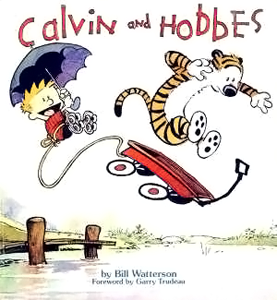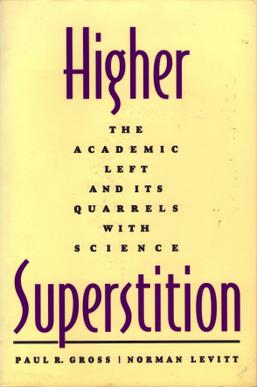Related Research Articles

William Boyd Watterson II is an American cartoonist who authored the comic strip Calvin and Hobbes. The strip was syndicated from 1985 to 1995. Watterson concluded Calvin and Hobbes with a short statement to newspaper editors and his readers that he felt he had achieved all he could in the medium. Watterson is known for his negative views on comic syndication and licensing, his efforts to expand and elevate the newspaper comic as an art form, and his move back into private life after Calvin and Hobbes ended. Watterson was born in Washington, D.C., and grew up in Chagrin Falls, Ohio. The suburban Midwestern United States setting of Ohio was part of the inspiration for the setting of Calvin and Hobbes. Watterson lives in Cleveland Heights, Ohio as of January 2024.

Calvin and Hobbes is a daily American comic strip created by cartoonist Bill Watterson that was syndicated from November 18, 1985, to December 31, 1995. Commonly described as "the last great newspaper comic", Calvin and Hobbes has enjoyed enduring popularity, influence, and academic and even a philosophical interest.
Gibberish, also known as jibber-jabber or gobbledygook, is speech that is nonsense: ranging across speech sounds that are not actual words, pseudowords, language games and specialized jargon that seems nonsensical to outsiders.
The Sokal affair, additionally known as the Sokal hoax, was a demonstrative scholarly hoax performed by Alan Sokal, a physics professor at New York University and University College London. In 1996, Sokal submitted an article to Social Text, an academic journal of cultural studies. The submission was an experiment to test the journal's intellectual rigor, specifically to investigate whether "a leading North American journal of cultural studies—whose editorial collective includes such luminaries as Fredric Jameson and Andrew Ross—[would] publish an article liberally salted with nonsense if (a) it sounded good and (b) it flattered the editors' ideological preconceptions."
Jargon or technical language is the specialized terminology associated with a particular field or area of activity. Jargon is normally employed in a particular communicative context and may not be well understood outside that context. The context is usually a particular occupation, but any ingroup can have jargon. The key characteristic that distinguishes jargon from the rest of a language is its specialized vocabulary, which includes terms and definitions of words that are unique to the context, and terms used in a narrower and more exact sense than when used in colloquial language. This can lead outgroups to misunderstand communication attempts. Jargon is sometimes understood as a form of technical slang and then distinguished from the official terminology used in a particular field of activity.
In linguistics, a neologism is any newly formed word, term, or phrase that has achieved popular or institutional recognition and is becoming accepted into mainstream language. Most definitively, a word can be considered a neologism once it is published in a dictionary.

Higher Superstition: The Academic Left and Its Quarrels with Science is a 1994 book about the philosophy of science by the biologist Paul R. Gross and the mathematician Norman Levitt.

Alan David Sokal is an American professor of mathematics at University College London and professor emeritus of physics at New York University. He works with statistical mechanics and combinatorics.

Fashionable Nonsense: Postmodern Intellectuals' Abuse of Science, first published in French in 1997 as Impostures intellectuelles, is a book by physicists Alan Sokal and Jean Bricmont. As part of the so-called science wars, Sokal and Bricmont criticize postmodernism in academia for the misuse of scientific and mathematical concepts in postmodern writing.

In philosophy, the terms obscurantism and obscurationism identify and describe the anti-intellectual practices of deliberately presenting information in an abstruse and imprecise manner that limits further inquiry and understanding of a subject. The two historical and intellectual denotations of obscurantism are: (1) the deliberate restriction of knowledge — opposition to the dissemination of knowledge; and (2) deliberate obscurity — a recondite style of writing characterized by deliberate vagueness.
The science wars were a series of scholarly and public discussions in the 1990s over the social place of science in making authoritative claims about the world. Encyclopedia.com, citing the Encyclopedia of Science and Religion, describes the science wars as the

Academic writing or scholarly writing refers primarily to nonfiction writing that is produced as part of academic work in accordance with the standards of a particular academic subject or discipline, including:
Linguistic transparency is a phrase which is used in multiple, overlapping subjects in the fields of linguistics and the philosophy of language. It has both normative and descriptive senses.
Bill Watterson's comic strip Calvin and Hobbes features a wide range of secondary characters. These range from Calvin's fellow students at school to monsters and aliens from Calvin's vivid imagination.

In linguistics, reappropriation, reclamation, or resignification is the cultural process by which a group reclaims words or artifacts that were previously used in a way disparaging of that group. It is a specific form of a semantic change. Linguistic reclamation can have wider implications in the fields of discourse and has been described in terms of personal or sociopolitical empowerment.

The Postmodernism Generator is a computer program that automatically produces "close imitations" of postmodernist writing. It was written in 1996 by Andrew C. Bulhak of Monash University using the Dada Engine, a system for generating random text from recursive grammars. A free version is also hosted online. The essays are produced from a formal grammar defined by a recursive transition network.
The term physics envy is used to criticize modern writing and research of academics working in areas such as "softer sciences", philosophy, liberal arts, business administration education, humanities, and social sciences. The term argues that writing and working practices in these disciplines have overused confusing jargon and complicated mathematics to seem more 'rigorous' as in heavily mathematics-based natural science subjects like physics.
A pejorative word, phrase, slur, or derogatory term is a word or grammatical form expressing a negative or disrespectful connotation, a low opinion, or a lack of respect toward someone or something. It is also used to express criticism, hostility, or disregard. Sometimes, a term is regarded as pejorative in some social or ethnic groups but not in others or may be originally pejorative but later adopt a non-pejorative sense in some or all contexts.
Criticism of postmodernism is intellectually diverse, reflecting various critical attitudes toward postmodernity, postmodern philosophy, postmodern art, and postmodern architecture. Postmodernism is generally defined by an attitude of skepticism, irony, or rejection towards what it describes as the grand narratives and ideologies associated with modernism, especially those associated with Enlightenment rationality. Thus, while common targets of postmodern criticism include universalist ideas of objective reality, morality, truth, human nature, reason, science, language, and social progress, critics of postmodernism often defend such concepts.
Translanguaging is a term that can refer to different aspects of multilingualism. It can describe the way bilinguals and multilinguals use their linguistic resources to make sense of and interact with the world around them. It can also refer to a pedagogical approach that utilizes more than one language within a classroom lesson. The term "translanguaging" was coined in the 1980s by Cen Williams in his unpublished thesis titled "An Evaluation of Teaching and Learning Methods in the Context of Bilingual Secondary Education". Williams used the term to describe the practice of using two languages in the same lesson, which differed from many previous methods of bilingual education that tried to separate languages by class, time, or day. In addition, Vogel and Garcia argued that translanguaging theory posits that rather than possessing two or more autonomous language systems, as previously thought when scholars described bilingual or multilingual speakers, bilinguals and multilingual speakers select and deploy their languages from a unitary linguistic repertoire. However, the dissemination of the term, and of the related concept, gained traction decades later due in part to published research by Ofelia García, among others. In this context, translanguaging is an extension of the concept of languaging, the discursive practices of language speakers, but with the additional feature of using multiple languages, often simultaneously. It is a dynamic process in which multilingual speakers navigate complex social and cognitive demands through strategic employment of multiple languages.
References
- 1 2 3 4 5 6 7 Biber, Douglas; Gray, Bethany (2016). Grammatical Complexity in Academic English: Linguistic Change in Writing. Cambridge University Press. ISBN 978-1-107-00926-4.
- 1 2 Blyth, Mark (2012-03-09). "Five minutes with Mark Blyth: "Turn it into things people can understand, let go of the academese, and people will engage"". Impact of Social Sciences. Archived from the original on 2012-03-22. Retrieved 2021-09-01.
- 1 2 3 4 5 6 7 8 9 10 Lockhart, Heather (2015). "Academia, Here I Come!" : Plain Language and Academese in the Postsecondary Academy (MA thesis). Montclair State University.
- 1 2 Pinker, Steven (26 September 2014). "Why Academics Stink at Writing". www.chronicle.com. Archived from the original on 2020-09-04. Retrieved 2021-09-01.
- 1 2 3 4 5 6 7 Mey, Jacob (1985). Whose Language?: A Study in Linguistic Pragmatics. John Benjamins Publishing. pp. 71–77. ISBN 978-90-272-5004-9.
- 1 2 3 Ekundayo, Steven; Omowumi, Olabode; Sokari, Stanley (2019). "Writing Right in Academese: The Language of Academic and Research Report Writing" (PDF). CLAREP Journal of English and Linguistics. 1: 31–60. doi:10.56907/gs6bxd76. S2CID 254339258.[ dead link ]
- ↑ Young, Meredith E.; Norman, Geoffrey R.; Humphreys, Karin R. (2008-12-08). "The Role of Medical Language in Changing Public Perceptions of Illness". PLOS ONE. 3 (12): e3875. Bibcode:2008PLoSO...3.3875Y. doi: 10.1371/journal.pone.0003875 . ISSN 1932-6203. PMC 2587237 . PMID 19060953.
- ↑ Baron, Joanne (2016). Patron Gods and Patron Lords: The Semiotics of Classic Maya Community Cults. University Press of Colorado. ISBN 978-1-60732-518-5.
- ↑ "The Bad Writing Contest". 2020-12-08. Archived from the original on 2020-12-08. Retrieved 2021-09-02.
- ↑ Guardian Staff (1999-12-24). "The world's worst writing". the Guardian. Retrieved 2021-09-02.
- ↑ Birkenstein, Cathy (2010). "We Got the Wrong Gal: Rethinking the "Bad" Academic Writing of Judith Butler". College English. 72 (3): 269–283. doi:10.58680/ce20109436. ISSN 0010-0994. JSTOR 25653028.
- ↑ Charney, Davida (1986). "Review of Writing for Social Scientists: How to Start and Finish Your Thesis, Book, or Article". Rhetoric Society Quarterly. 16 (4): 313–316. doi:10.1080/02773948609390757. ISSN 0277-3945. JSTOR 3885547.
- ↑ Watterson, Bill (2013-02-14). "Calvin and Hobbes by Bill Watterson for February 14, 2013 | GoComics.com". GoComics. Retrieved 2021-09-02.
- ↑ "PHD Comics: Deciphering Academese". phdcomics.com. Retrieved 2021-09-02.